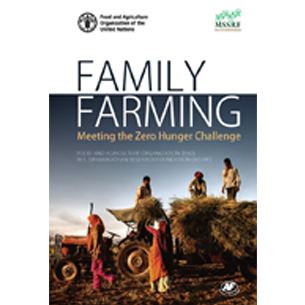Download Catalogue...
About the Author
PRINT
Food And Agriculture Orgainzation (fao)
That family farming can meet the Zero Hunger Challenge launched at the Rio + 20 Summit in 2012 is the thesis behind this collection of papers, rich in data and content on issues relating to India and the larger Asia Pacific context. Presented as background for the Asia- Pacific Regional Consultation commemorating
2014 as the International Year of Family Farming, these papers emphasise the fact that family farming is both a way of life and a means to sustainable livelihood. Agricultural economists, anthropologists, scientists, academics have come together to bring out clearly the importance of family
farming in agriculture, highlighting gender roles as well as mainstreaming nutritional aspects. Not just strengthening household food, nutrition and livelihood security, family-run farms have helped conserve agro-biodiversity and a wide range of crop varieties, and made seed production and storage a part of
their work and culture. This book will capture the interest of everyone who believes a hunger-free world is not an impossible dream.
Brilliantly written and well-grounded in real life examples, this collection of Science for Sustainable Development research papers explores in a concise form the role family farming has played in addressing one of the pressing challenges of our age—reducing hunger.
— Dr. Daniel Ruiz de Garibay
Asia-Pacific Sector Coordinator, World Rural Forum.
Family farms produce the majority of Asia’s food using, on average, a hectare of land or less a piece. As populations grow, living standards rise, and as populations migrate into cities from rural areas, they will be under more pressure than ever to improve their yields and to withstand climactic and market shocks. At IFAD, we
invest in these smallholder and family farms because we have seen, over and over again, that it is possible for them to meet these challenges. Family farming has proven its potential to be an efficient, lucrative, and environmentally sound business. This publication provides a fresh and much-welcomed perspective on how
we can better ensure that the business of family farming sustains inclusive rural development for generations to come.
— Dr. Hoonae Kim
Director, Asia and the Pacific Region, International Fund for Agricultural Development (IFAD), Rome.







